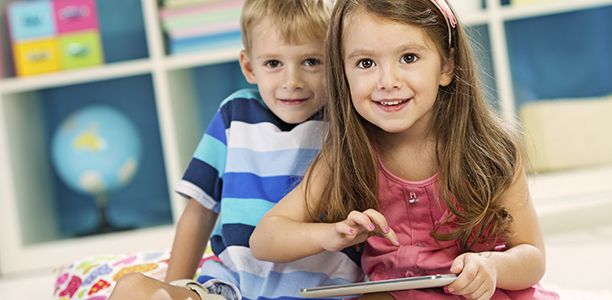Tablets such as iPads can be used in kindergartens and primary schools to help children learn important skills, according to ongoing research.
While many parents are concerned that tablets might undermine a child’s love of reading traditional books, Victoria University researcher Professor Nicola Yelland found that some Apps encouraged reading and cooperative play, as well as helping children as young as two years of age develop “foundation skills” in maths, such as sorting, matching, classifying and counting.
Professor Yelland studied the use of tablets with 95 children: two- and three-year-olds in a mother’s group; four-year-olds at a kindergarten; and children aged five and six in a prep class. The Apps included electronic books, games incorporating characters from books as well as specific skill-building games, and Apps that enabled making music and creating scenes with characters.
Ipads were the focus in the first two years of the study. This year the study is looking at the way kindergarten children, seven-year-olds and 12- and 13-year-olds use Microsoft Surface Pro II tablets.
Professor Yelland, who is research director at the College of Education, will present the findings of the second year of her project on 23 October as part of the VU College of Education’s Diamond Series seminars at Kingsville Primary School.
Professor Yelland found kindergarten children did not want advice from adults, preferring to “do their own thing”: “They wanted to explore the range of each App’s potential, either individually or with a friend, to figure out what it did, and they often formed groups of two or more to take turns playing games.” The Apps encouraged them to use complex game strategies and skills and reading and comprehension, such as recognising letters and numbers.
“The four-year olds were adventurous and persistent. They loved the immediate feedback when they answered correctly,” Professor Yelland says. “Children who often had trouble concentrating on a specific task appeared to have no problem when using the tablet.”
One of the teachers in the study also used the tablet to follow up the children’s interests on the internet. For example, they were able to identify bugs found in the playground, or watch footage of a volcano erupting as preparations for experiments in the sandpit.
For the prep students, many of whom did not speak English at home, Apps were chosen to help their language skills, number recognition and fine motor skills. “One of the teachers commented that the tablet session made the children’s faces light up,” Professor Yelland says.
Even two-year-olds managed tablets, she found: “The ones in my study were able to quickly learn how to navigate the game or the tablet, for example, exiting the games via the ‘home’ button, switching games regularly and turning the tablet on and off.”
Two-year-olds usually do not play with other children but play by themselves alongside others in what is known as “parallel play”. When playing with a tablet, however, another two-year-old would sometimes come over to watch and they would talk and interact together. “This was unique to tablet play,” Professor Yelland says.
However, Professor Yelland also found that many of the Apps marketed for young children were not useful or enjoyable for them. She noted, “The claims of the developers are often over-inflated and sometimes the App is very limited and does not use the full potential of the tablet.”
(Source: Victoria University)










